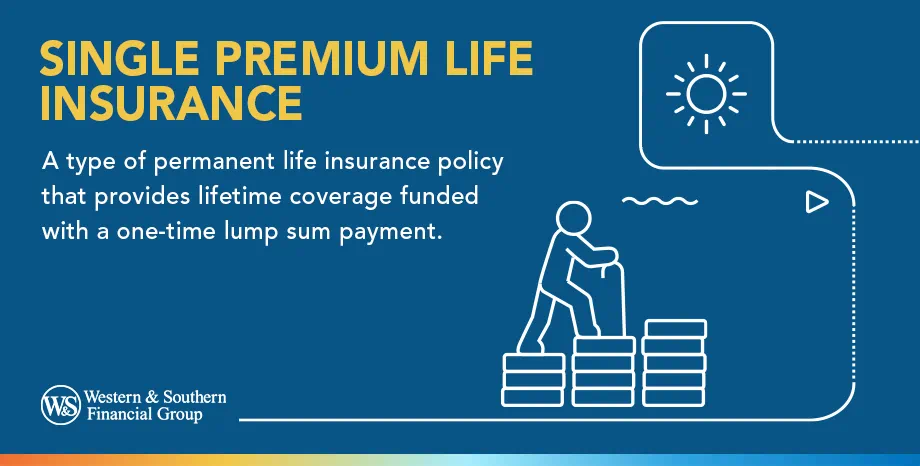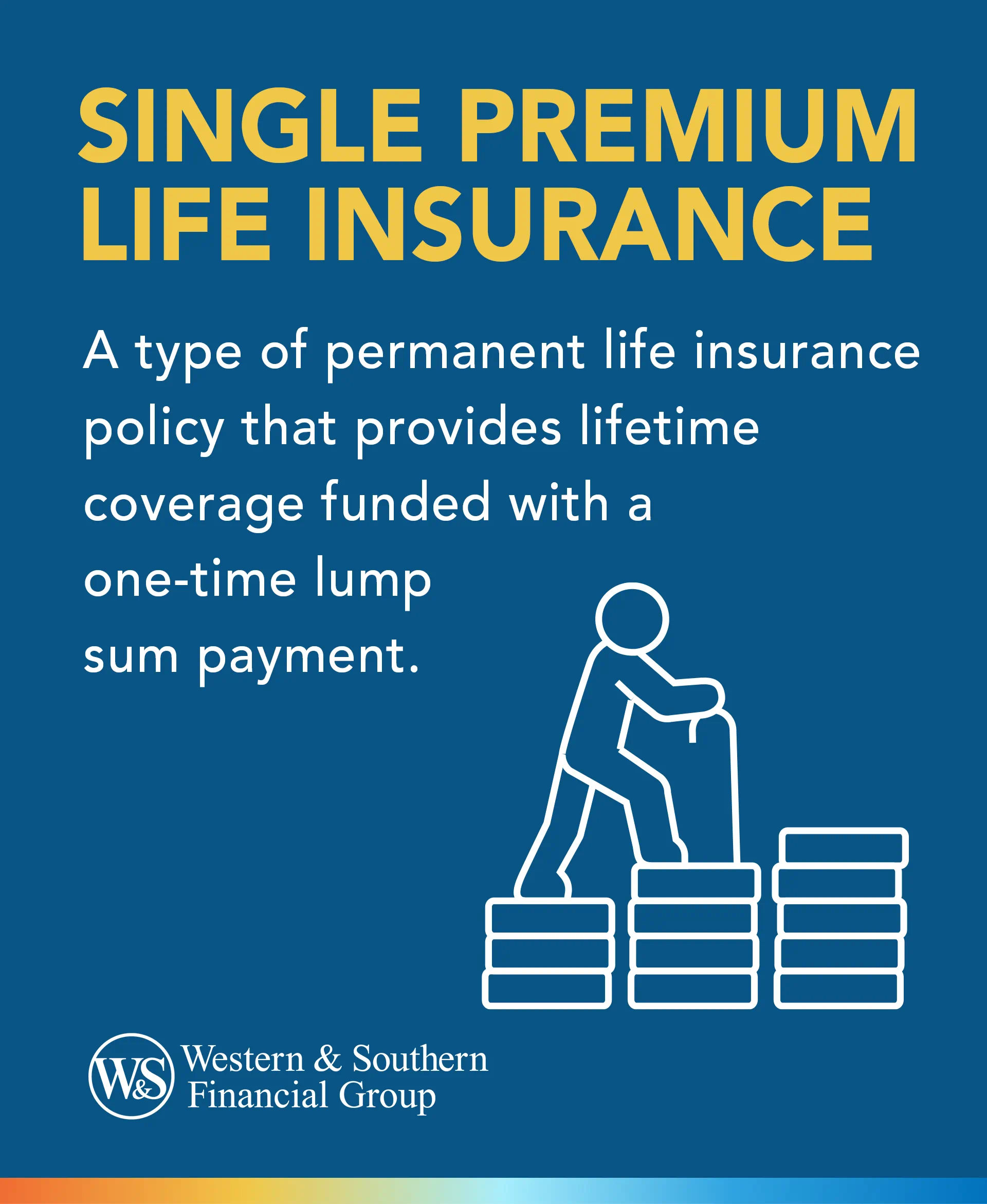

Table of Contents
- Single Premium Life Insurance Defined
- What Are the Different Types of Single Premium Life Insurance Policies?
- What Are the Benefits of Single Premium Life Insurance?
- What Are the Potential Drawbacks of Single Premium Life Insurance?
- What Are the Tax Implications of a Single Premium Life Policy?
- Is Single Premium Life Insurance Right for You?
- Who Can Help With This Decision?
Key Takeaways
- Single Premium Life Insurance requires one lump sum payment, offering immediate full coverage and freeing the policyholder from ongoing premiums.
- It serves as a tool for estate planning and wealth transfer, providing tax advantages such as tax-deferred growth and tax-free death benefits to beneficiaries.
- Various types exist, including Single Premium Whole Life Insurance, Universal Life Insurance, and Variable Life Insurance, each with distinct investment components and levels of guaranteed benefits.
- While it offers several advantages, it has drawbacks like high upfront costs, limited flexibility, and potential tax implications if not managed properly.
- Consulting a financial representative or insurance specialist is crucial to evaluate whether this policy aligns with individual needs and goals.
Single Premium Life Insurance Defined
Single Premium Life Insurance is a permanent life insurance policy where the policyholder pays the entire premium amount in one lump sum rather than making regular premium payments over the policy's life. Once this single payment is made, the policy remains in force for the insured's lifetime or until the maturity date without any additional premium payments.
What Are the Different Types of Single Premium Life Insurance Policies?
Single Premium Life Insurance is a type of permanent life insurance categorized primarily based on the underlying investment component and the degree of guaranteed benefits. Here are the main types:
- Single Premium Whole Life (SPWL): Traditional whole life insurance with a single premium payment. SPWL offers a guaranteed death benefit, a fixed rate of return on the cash value, and might earn dividends if it's a participating policy. The cash value growth is tax-deferred.
- Single Premium Universal Life (SPUL): These policies also earn interest, but the rate can go up and down each year depending on market conditions. There is less certainty over how much you will end up with versus single premium whole life insurance.
- Single Premium Variable Life (SPVL): A policy with an investment component tied to various investment options. The policyholder can allocate the cash value among a variety of investment options. The growth potential is unlimited, but there is also the risk of loss.
What Are the Benefits of Single Premium Life Insurance?
- One-Time Payment: As the name suggests, Single Premium Life Insurance requires only one single premium payment, freeing the policyholder from ongoing premiums. This is particularly advantageous for those with a significant amount of money upfront and who prefer not to manage regular payments.
- Immediate Full Coverage: The policyholder is covered for the entire death benefit from the moment the single premium is paid. This means that even if something were to happen shortly after purchasing the policy, beneficiaries would receive the full benefit.
- Cash Value Accumulation: A portion of your single premium often goes into the policy's cash value. Over time, this cash value can grow, depending on the interest rates or investment options chosen, depending on the type of policy (whole life, universal life, or variable life).
- Tax-Deferred Growth: The increase in the cash value account of a Single Premium Life Insurance policy is usually tax-deferred. This means you won't owe income taxes on any earnings unless you withdraw them, allowing for compound growth without annual tax deductions.
- Access to Cash: Policyholders can borrow against the cash value or make partial withdrawals depending on the policy's terms. This provides flexibility in accessing funds if needed, though it's essential to note that this could reduce the death benefit.
- No Policy Lapses: Since the policy is fully paid up, there's no risk of it lapsing due to missed payments, ensuring continuous coverage.
- Estate Planning Benefits: Single Premium Life Insurance can be an effective tool for estate planning, providing beneficiaries with a tax-free death benefit. In some scenarios, it can be combined with trusts to enhance estate tax benefits.
- Potential for Dividends: If the Single Premium Life Insurance policy is with a mutual insurance company and is a participating policy, there's a possibility of earning dividends. These dividends can be reinvested, taken as cash, or used to purchase additional coverage.
- Less Hassle: Without the need to manage and remember regular premium payments, there's less administrative hassle involved.
While these benefits make Single Premium Life Insurance an attractive option for many, weighing them against potential drawbacks, such as surrender charges and tax implications on early withdrawals, is crucial. Always consult a financial planner or insurance specialist to ensure the policy aligns with individual financial goals and needs.
What Are the Potential Drawbacks of Single Premium Life Insurance?
Single premium life insurance offers several benefits, but there are also some potential drawbacks to consider:
- High upfront cost: Single Premium Life Insurance requires a substantial lump sum payment upfront. This might not be feasible for everyone and could tie up a significant portion of one's liquidity.
- Limited flexibility: Once you purchase a single premium life insurance policy, you have little flexibility to change it.
- Tax implications: If you withdraw cash value from your single premium life insurance policy before age 59½, you may have to pay income tax and a 10% early withdrawal penalty.
- Surrender charges: If you decide to surrender the policy early, you may face surrender charges. These charges can erode significant cash value, especially in the policy's initial years.
- Modified endowment contract (MEC) status: Single premium life insurance policies are considered modified endowment contracts (MECs), which means they are subject to special tax rules. For example, if you withdraw money from your policy, you may be subject to taxation to the extent that the money in the policy has grown.
Given these potential drawbacks, it's crucial for individuals to thoroughly evaluate whether Single Premium Life Insurance aligns with their financial goals and circumstances. Consulting with a financial advisor or insurance specialist can offer clarity and ensure that one makes an informed decision.
What Are the Tax Implications of a Single Premium Life Policy?
The IRS considers Single Premium Life policies modified endowment contracts (MECs). This means that they are subject to special tax rules.
The main tax implications of a single premium cash value policy are as follows:
- Tax-deferred growth: The cash value in a single premium cash value policy grows tax-deferred. This means you do not have to pay income tax on the earnings until you withdraw the money.
- Early withdrawal penalty: If you withdraw money from a single premium cash value policy before age 59½, you may have to pay income tax on the earnings portion of the withdrawal. You may also have to pay a 10% early withdrawal penalty.
- MEC tax: The owner will owe tax on a withdraw to the extent of any gain in the policy. As for 59 1/2, all that refers to is the 10% additional tax that will apply to the regular taxation on a withdraw.
Is Single Premium Life Insurance Right for You?
A Single Premium Life (SPL) policy is a specific type of life insurance product that isn't suitable for everyone. Whether or not SPL insurance is worth it depends on your financial goals and needs. Here are some factors to consider:
When a Single Premium Life Policy May Make Sense:
Lump Sum Available: If you have received a windfall, inheritance, or a significant amount of money and you're looking for an avenue to invest or allocate it, an SPL policy might be a good option. Instead of paying premiums regularly over the years, you can cover your insurance needs with one single lump sum premium payment.
Desire for Immediate Coverage: With an SPL, you get immediate full coverage for the entire death benefit amount right from when the premium is paid.
Estate Planning: SPL can be an effective tool in estate planning. The death benefit can provide a tax-free inheritance to beneficiaries. Additionally, with proper planning, it can be used to cover potential estate taxes or be structured within trusts to benefit heirs further.
Guaranteed Growth: An SPL might be appealing if you're looking for a conservative investment avenue that provides guaranteed growth (especially true for Single Premium Whole-Life policies). The cash value in the policy grows tax-deferred.
Wealth Transfer Objectives: SPL policies can efficiently transfer wealth to the next generation, particularly if the policyholder is older and the primary aim is a quick and tax-efficient wealth transfer.
Avoiding Probate: Life insurance benefits, including those from SPL policies, generally bypass probate, allowing beneficiaries to access funds more quickly than assets passed through a will.
Asset Protection: In some jurisdictions, the cash value component of life insurance policies, including SPL, is protected from creditors. This can offer a layer of financial security for individuals concerned about potential future creditors.
Supplement Retirement Income: The cash value of an SPL policy can be borrowed against or withdrawn from, providing an additional source of funds during retirement. However, policyholders must be cautious about reducing the death benefit or triggering tax implications.
When a Single Premium Life Policy May Not Make Sense:
Limited Cash Availability: It won't be a viable option if an individual doesn't have sufficient funds to afford the large, one-time upfront payment required for an SPL policy.
Higher Yield Investment Opportunities: If other investment opportunities offer higher potential returns and align with the individual's risk tolerance and financial goals, the lump sum might be better utilized there.
Income Replacement Needs: For those seeking life insurance primarily as an income replacement tool, term life insurance may be more appropriate and cost-effective. SPL may not offer sufficient coverage relative to the premium paid.
Potential for Over-insurance: If an individual already has adequate life insurance coverage, purchasing an SPL policy might lead to unnecessary over-insurance, with resources possibly better allocated elsewhere.
Unfavorable Tax Implications: If managed improperly, SPL can lead to unfavorable tax consequences and implications, especially when classified as a Modified Endowment Contract (MEC). Depending on individual circumstances, other life insurance products might offer more favorable tax treatment.
Young Families with Budget Constraints: Young families, typically with more limited financial resources and higher financial obligations, may find the high upfront cost of SPL policies prohibitive and may be better served by a term or regular whole-life policy.
Remember that various types of life insurance policies and optional life insurance riders may suit your needs and financial situation. It is important to take the time to thoroughly research buying life insurance and consider all available options, taking into account your financial objectives, family, and personal preferences.
Who Can Help With This Decision?
A financial representative can help you run the numbers for a single premium policy and explain the details. They can help you evaluate the costs and benefits of life insurance based on your specific needs and goals.
You may also want to discuss this strategy with your accountant and your estate plan attorney (if you have one). As a team, these professionals can help ensure your life insurance and estate plan strategy makes sense.
In a world full of choices, doing your research could help you decide whether a single premium life policy's financial stability, security, and tax benefits are a good fit for your financial plan.















